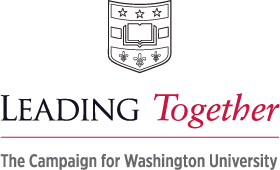
-

- Leading Together
- Understanding the Brain
- Cancer and Personalized Medicine
- Diabetes, Heart Disease, and Obesity
- Infectious Diseases and Global Health
- The Next Generation
- The Annual Fund
- Switched to Heroin
- Pitch Perfect
- Genetic portraits
- ICTS grant
- Medicine appointment
- Visionary research
- Keating retires
- Institute of Medicine electees
- NFL concussion study
- Recycling effort
- Verdant oasis

In the 20th century, we changed the understanding of medicine.
In the 21st century, we are transforming the very meaning of medicine.
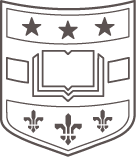
The urgent need to discover the causes of the most common diseases and to apply this knowledge to successful treatments has never been greater. An aging population in America — and a growing underserved population worldwide — have pushed traditional health care delivery to a breaking point.
The solutions are complex, and yet for Washington University School of Medicine, the action is straightforward. Our mission is to lead in the advancement of human health. We must train the next generation of medical leaders. We must martial our extraordinary scientific resources to eliminate entire diseases and find treatments that improve and prolong lives. And, ultimately, we must take major steps to improve our efficiency in streamlining health care delivery, reducing unnecessary costs, and serving populations in need.
Fortunately, our School of Medicine is one of the few institutions — anywhere — with the vision, depth of experience, and combined intellect required to do what can and must be done to advance human health. Through innovative research, outstanding clinical care, and the forward-thinking education of tomorrow’s leaders in medicine, we have achieved international prominence.
Yet, the task is great — so great, in fact, that it is easy for us to question how an individual can have the ability to make a significant difference. However, there is no question that every gift matters.
We invite you to be part of a historic endeavor:
Leading Together — The Campaign for Washington University
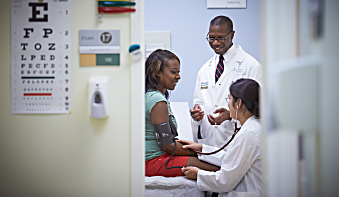
A major, multi-year fundraising initiative, Leading Together: The Campaign for Washington University, has been announced by Washington University in St. Louis to build on its strong history and further evolve the university’s global leadership.
At the School of Medicine, that translates to leveraging our strengths throughout the university to develop techniques and treatments necessary to help ever-greater numbers of people throughout the world to live better and longer than previously thought possible.
“From helping our neighbors take control of their health to providing cures in countries where people are still dying from easily treatable diseases, the faculty, students, and alumni of our School of Medicine will continue to pursue new ways to save and improve lives,” says Chancellor Mark S. Wrighton. “With the support of our alumni, parents, friends, corporations, and foundations, we can build upon the accomplishments of recent decades and contribute even more significantly to our communities, our nation, and the world.”

Medical school campaign priorities
The campaign’s four themes — preparing the leaders of tomorrow, advancing human health, inspiring innovation and entrepreneurship, and enhancing the quality of life — will be the focus of School of Medicine efforts during the campaign.
To succeed in each of these areas, fundraising targets for five priorities have been identified:
-
to attract and retain outstanding faculty: $240 million
-
to attract a talented and diverse student body: $40 million
-
to advance the scholarship, research, and creative potential of students and faculty: $750 million
-
to further strengthen an exceptional teaching, research, and working environment: $40 million
-
to enhance excellence throughout the school by increasing unrestricted annual support: $30 million
“Our overarching vision is to use our resources as a top-tier institution to make significant and lasting contributions to advancing human health,” says Larry J. Shapiro, MD, executive vice chancellor for medical affairs and dean. “To meet these challenges, we must gather resources and make broad changes to integrate our missions and strategically focus our efforts.”
Groundbreaking scientific discoveries over the past century have established the School of Medicine’s reputation as one of the great medical centers in America and throughout the world. The depth and breadth of scientific inquiry addressed by its researchers has a national and global impact, and its multi-pronged approach to research holds tremendous promise for rapid advances in deciphering fundamental causes of diseases. Ultimately, research conducted at the School of Medicine is transforming medicine, leading to better therapies and therapeutics.
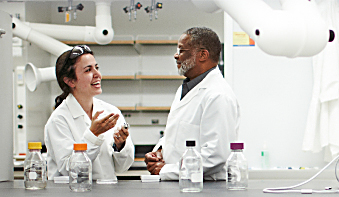
Attracting the best students and faculty
For the past 14 years, Washington University has recruited the top class of entering medical students in the country, and scholarships are critical to this success. The School of Medicine’s Programs in Occupational Therapy, Physical Therapy, and Audiology and Communication Sciences rank among the top three programs in each of their respective fields nationally. Signature graduate education programs in the Division of Biology and Biomedical Sciences and the Medical Scientist Training Program set the bar for peers. Likewise, residents and fellows at the school and our affiliated hospitals are among the best in the world.
Central to our continuing success is one of the world’s great medical faculties. In an increasingly competitive environment for engaging the best academicians, endowed professorships play an important role in recruiting and retaining the most important resource of the School of Medicine: the extraordinary people who lead the field in teaching and research. Increasing our number of endowed professorships is essential to our leadership position in the field.
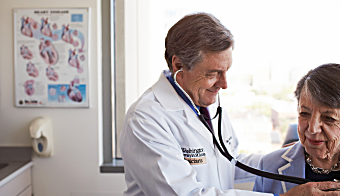
Recognizing our clinical physicians
Most importantly, School of Medicine physicians save lives — and directly work to improve the quality of life for tens of thousands of patients each year. With its hospital partners on the Washington University Medical Center campus — Barnes-Jewish Hospital and St. Louis Children’s Hospital — the School of Medicine is committed to providing the greatest level of healing in the world. From the most fragile infants to individuals with extremely rare diseases, physicians provide each patient with medical expertise that is grounded in the finest training possible. Working together, medical teams are skilled in innovative techniques and fully immersed in compassion for humankind.
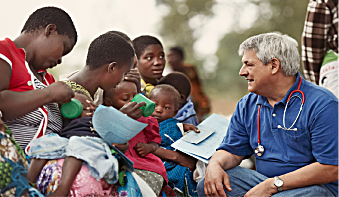
Local and global community outreach
Actively engaged in neighborhood clinics, schools, and community organizations that promote wellness, the faculty, students, and staff of the School of Medicine regularly volunteer clinical services in underserved areas of St. Louis, the United States, and at a growing number of international locations. Through these efforts, Washington University has demonstrated an unwavering commitment to the discovery of knowledge and the advancement of medical research and patient care.
Partnering for success
Washington University School of Medicine is a leading center for teaching, research, and patient care and is well-known for its tremendous innovation in genomics, neuroscience, imaging, infectious diseases, cardiology, and biomedical engineering, consistently ranking among the world’s finest medical institutions.
The following pages summarize key areas in which support is needed to advance human health:


